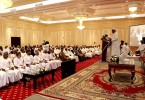Fakhri al-Arashi
In the first ten days of the Saudi-led coalition, the war on Yemen has disrupted people’s general life and doubled the poor’s suffering. Adding to that, the Saudi-allied air strikes on Yemen do not differentiate between military and non-military targets. Every suspected movement to them is classified as a military target for their air strikes.
Between the Saud–led coalition war, the Houthi fighters supported by the Yemeni military guards, and Popular Committees, are innocent Yemeni citizens dying and well-established business firms being shelled by both parties.
So far, five factories have been destroyed in the first five days of the Saudi-led coalition war on Yemen, including Yemen Cement Company in Lahj, the Coca Cola factory Lahj, al-Sawari factory in Lahj and Yemen Dairy and Juice Industries. Many other business factories’ infrastructure and equipment have been stolen either by armed gang groups or by military men.
“More than the act is the action of media of both sides whose ultimate goal is to duplicate facts and throw blame on second party’s misbehaviors in the war,” said Mohammed Saleh, a businessman in Sana’a and Lahj.
“I have two factories, one in Sana’a and the recent one in Lahj. The factory in Sana’a governorate, mainly in the Bani Mutar area, is near a Republican Guard base and it still operates perfectly. The one in Lahj has been partially damaged in the past few days as a result of unfocused artillery shells and heavy clashes in area.”
About 5,000 workers in the Lahj governorate in south Yemen have fled their working places of the above-mentioned factories. “Even families have immediately evacuated from Lahj governorate to different villages since the first day of the erupted war in the southern governorates,” said Saleh.
Lahj is considered the starting point for Houthi and soldiers to control Aden. It is the source of drinking water for the people of Aden as well. Lahj is 20-25 kilometers from Aden. For that, Houthi forces backed by military men loyal to the former President Ali Abdullah Saleh, consider it the most strategic backup for them to achieve their mission in Aden and return quickly.
It is rare to see people walking or shopping in Lahj. It has turned into a city of ghosts, bloodshed, and death. People are dying of hunger or lack of drinking water.
Another owner of a business service provider who preferred not to be mentioned told National Yemen that his factory is at risk after the bombardment of some factories within the same area. He said that anti-air forces are replying to the Saudi–led coalition air strikes from a close area nearby his factory and he is scared of Saudi airstrikes targeting his factory.
A few days ago, two men were dressed up as military men approached the factory’s guard and asked him for water. They kept questioning him and asking him for food to eat. Once he went in to get them something to eat, they rushed in. They stole the two cars and money. “The guard confirmed to me that he sees the cars every day moving soldiers but he couldn’t tell them to return cars back,” said the factory owner. “I am not as worried about the two cars as I am worried about my more than three million US dollar investment. As I am based on Sana’a, my staff in Lahj ran away without asking for their payment. I do not know where they are and what are they doing but I believe they are in a safe place,” said the owner.
In his message to Yemeni and Saudi officials, Mohammed Saleh has called up on them to resume dialogue as peace is the call of every one in the north and south. “The place of dialogue does not matter. They can set in a middle area in between borders if they wish to save people’s lives,” he said. “Once the war ends, I will ask for restitution for losing my business. The Yemeni government and the Saudis are very much responsible for what is happening in Yemen.”
“The war has killed my expansion business plan which was about to start in the middle of this year in Taiz and Ibb governorates,” al-Shabibi continued to say. “I am planning to move my investments out of Yemen and I will not consider any investment here unless I find a fair restitution.”
The air campaign happened in response to the Yemeni President Abdu-Rabbo Mansour Hadi’s call for the GCC to protect legitimacy in Yemen. Since then, Saudi Arabia and ten countries including Pakistan and Turkey have given logistical support for the coalition.
Many business industries are about to close in Yemen in the next few days, either to avoid the air strikes like the Yemen Dairy & Juice Industries factory in Hodeidah governorate, or as a result of the applied sanctions by the Saudi government who controls Yemen’s sea, air and land since day one of its war on Yemen.
“We do not have the ability to import the required materials to run our business. The shortages of fuel and electricity are another challenge to maintain productivity. If those are available, I can guarantee the lack of cash with buyers,” said Saleh. “The Yemeni people are stuck in the middle of unfair calculations.”
“It becomes challenging for businesses to provide services or remain open in south Yemen.” Even the staff are fleeing their jobs after the death of tens of employees in Hodeidah and Lahj business factories.
“It distorts investments and the normal way the companies do business,” he ended his statement.


